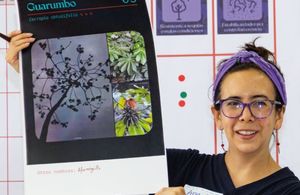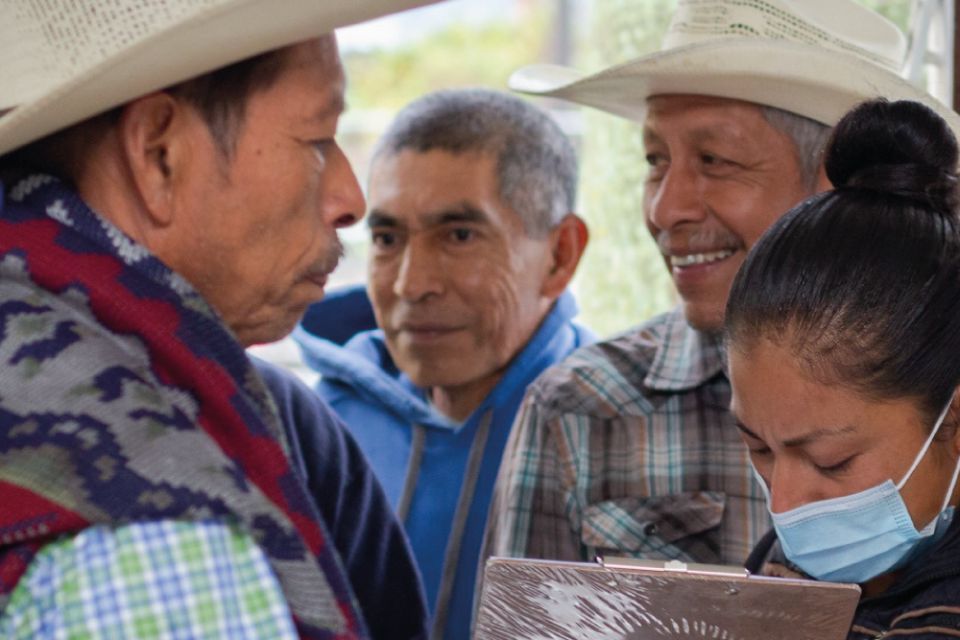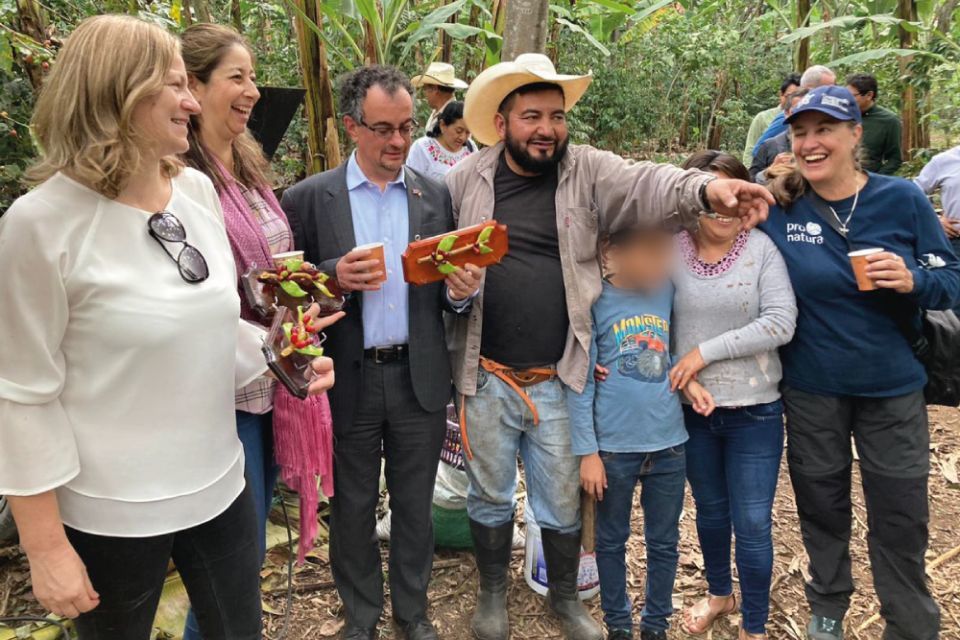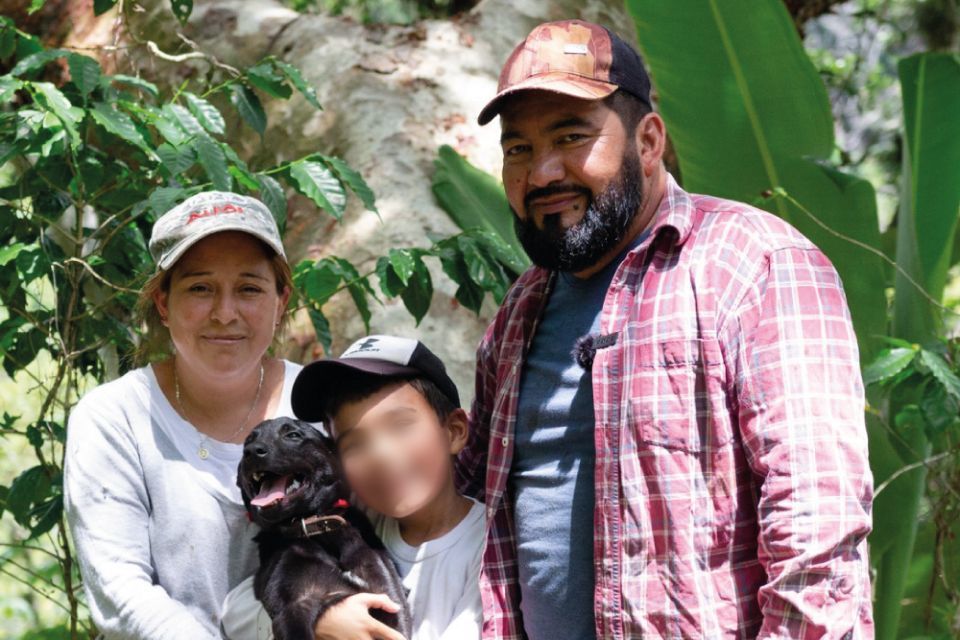UKPACT helps local communities and forest preservation in Mexico
Increased incomes for local communities and forest preservation amongst the many benefits of UKPACT shade coffee initiative.

Scientists from Mexico’s National University (UNAM) and the UK Royal Botanical Gardens at Kew assessed almost 2,000 tree species for their ability to improve coffee farming sustainability in Veracruz.
Temperature increases due to climate change are having negative effects on coffee growing in Mexico. In the state of Veracruz, there are 30 thousand hectares of land dedicated to coffee and estimates show that, if temperatures continue rising, 58% of coffee production would end by 2040. The community living in Amatlan de los Reyes is the highest at-risk population since they risk losing 100% of their coffee production and annual income.
The United Kingdom’s Partnership for Accelerated Climate Transitions Programme (UK PACT) is supporting communities like Amatlan de los Reyes to mitigate against climate change by promoting sustainable coffee farming. This support focuses on giving coffee plants life-saving shade to protect them against higher temperatures. Providing coffee plants with a canopy of tree shade has many other benefits. For example, the new trees capture carbon emissions and increase communities’ incomes, as they are able to harvest fruit, medicinal ingredients and sustainable wood. All of this contributes to wider forest and habitat preservation.

UKPACT is supporting communities like Amatlan de los Reyes to mitigate against climate change by promoting sustainable coffee farming.
Dr Robert Hunter Manson from Mexico’s Institute of Ecology explains another serious problem stemming from climate change: Rising temperatures are increasing infestations of a pest called coffee rust. Due to higher temperatures, this disease is spreading to new areas, and is accelerating its life cycle from two to ten infestations per year.
Additionally, preserving the natural ecosystems of the mountain cloud forests of Veracruz is important because it is extremely rich in diversity of species. Even though it accounts for one percent of Mexican territory, it is home to ten percent of the country’s flora. This makes it a perfect place to conduct a selection of trees as part of this UKPACT project.
Together, scientists from Mexico’s National University (UNAM) and the UK Royal Botanical Gardens at Kew assessed almost 2,000 tree species for their ability to improve coffee farming sustainability in Veracruz. This resulted in a pre-selection of 50 species that, among other things, grow fast, have dense and perennial foliage to provide shade, have high carbon-sequestering capacity, and have deep roots to provide long life.
The coffee-growing communities of Huatusco and Teocelo, in the heart of the cloud forest, played a central role in this project. ProNatura Veracruz led several workshops where women and men voiced their opinions about the utility and value with each pre-selected tree species. This included other aspects such as usefulness in cooking, and by-products, such as handcrafts and tools. The communities also explained how some of the trees are important symbols in ancestral beliefs.
As part of the group decisions seven tree species were selected for the next phase of the project. UNAM scientists calculate that for every hectare planted with these trees, six tonnes of CO2 will be removed from the environment per year. This is equivalent to the annual CO2 released while powering an average Mexican home. His Majesty’s Ambassador to Mexico, Jon Benjamin, participated in the last workshop and heard how the communities will benefit from this initiative. For example, shade coffee is better quality with a richer flavour and fetches higher prices in coffee markets.

His Majesty’s Ambassador to Mexico, Jon Benjamin, participated in the last workshop and heard how the communities will benefit from this initiative.
Lili Alicona Paes, one of the project participants, stated
This project has changed the way we think about the relationship between trees and our coffee plants. Before, deforestation was common. Now we know that the trees are essential and we have to preserve them. We also know that trees with more foliage provide more shade and reduce pest infestations. I want my grandchildren to benefit from the trees I am going to plant on my land. This makes me feel proud and I also feel proud to be a woman producer.
This initiative has produced training materials such as a written guide and videos available online to allow other communities to replicate this work in other parts of Mexico and anywhere in the world that coffee is produced. The partnership between the UK and Mexico will continue to strengthen the technical skills of the coffee-farming communities in Veracruz, improving their livelihoods while helping to mitigate the effects of climate change.

The partnership between the UK and Mexico will continue to strengthen the technical skills of the coffee-farming communities in Veracruz, improving their livelihoods while helping to mitigate the effects of climate change.